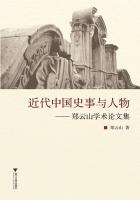Distribution, however, is not a merely passive result of production and exchange; it in its turn reacts upon both of these. Each new mode of production or form of exchange is at first retarded not only by the old forms and the political institutions which correspond to them, but also by the old mode of distribution; it can secure the distribution which is suitable to it only in the course of a long struggle. But the more mobile a given mode of production and exchange, the more capable it is of perfection and development, the more rapidly does distribution reach the stage at which it outgrows its progenitor, the hitherto prevailing mode of production and exchange, and comes into conflict with it. The old primitive communities which have already been mentioned could remain in existence for thousands of years -- as in India and among the Slavs up to the present day -- before intercourse with the outside world gave rise in their midst to the inequalities of property as a result of which they began to break up. On the contrary, modern capitalist production, which is hardly three hundred years old and has become predominant only since the introduction of modern industry, that is, only in the last hundred years, has in this short time brought about antitheses in distribution -- concentration of capital in a few hands on the one side and concentration of the propertyless masses in the big towns on the other -- which must of necessity bring about its downfall.
The connection between distribution and the material conditions of existence of society at any period lies so much in the nature of things that it is always reflected in popular instinct. So long as a mode of production still describes an ascending curve of development, it is enthusiastically welcomed even by those who come off worst from its corresponding mode of distribution. This was the case with the English workers in the beginnings of modern industry. And even while this mode of production remains normal for society, there is, in general, contentment with the distribution, and if objections to it begin to be raised, these come from within the ruling class itself (Saint-Simon, Fourier, Owen) and find no response whatever among the exploited masses. Only when the mode of production in question has already described a good part of its descending curve, when it has half outlived its day, when the conditions of its existence have to a large extent disappeared, and its successor is already knocking at the door --it is only at this stage that the constantly increasing inequality of distribution appears as unjust, it is only then that appeal is made from the facts which have had their day to so-called eternal justice. From a scientific standpoint, this appeal to morality and justice does not help us an inch further; moral indignation, however justifiable, cannot serve economic science as an argument, but only as a symptom. The task of economic science is rather to show that the social abuses which have recently been developing are necessary consequences of the existing mode of production, but at the same time also indications of its approaching dissolution,-and to reveal within the already dissolving economic form of motion, the elements of the future new organisation of production and exchange which will put an end to those abuses. The wrath which creates the poet [Juvenalis, Satirae , 1, 79 (si nature negat, facit indignatio versum). -- Ed .] is absolutely in place in describing these abuses, and also in attacking those apostles of harmony in the service of the ruling class who either deny or palliate them; but how little it proves in any particular case is evident from the fact that in every epoch of past history there has been no lack of material for such wrath.
Political economy, however, as the science of the conditions and forms under which the various human societies have produced and exchanged and on this basis have distributed their products -- political economy in this wider sense has still to be brought into being. Such economic science as we possess up to the present is limited almost exclusively to the genesis and development of the capitalist mode of production: it begins with a critique of the survivals of the feudal forms of production and exchange, shows the necessity of their replacement by capitalist forms, then develops the laws of the capitalist mode of production and its corresponding forms of exchange in their positive aspects, that is the aspects in which they further the general aims of society, and ends with a socialist critique of the capitalist mode of production, that is, with an exposition of its laws in their negative aspects, with a demonstration that this mode of production, by virtue of its own development, drives towards the point at which it makes itself impossible. This critique proves that the capitalist forms of production and exchange become more and more an intolerable fetter on production itself, that the mode of distribution necessarily determined by those forms has produced a situation among the classes which is daily becoming more intolerable -- the antagonism, sharpening from day to day, between capitalists, constantly decreasing in number but constantly growing richer, and propertyless wage-workers, whose number is constantly increasing and whose conditions, taken as a whole, are steadily deteriorating; and finally, that the colossal productive forces created within the capitalist mode of production which the latter can no longer master, are only waiting to be taken possession of by a society organised for co-operative work on a planned basis to ensure to all members of society the means of existence and of the free development of their capacities, and indeed in constantly increasing measure.














